PRINCETON, NJ -- Despite the recent political emphasis on wealth inequality and the call for higher taxes on the rich, more than six in 10 Americans think the United States benefits from having a class of rich people, unchanged from 22 years ago.

The findings, based on a Gallup poll conducted May 3-6, 2012, reflect the first update of a question Gallup initially asked in May 1990. The remarkable similarity in Americans' views over this 22-year span shows that despite the recent economic recession and the renewed focus from the Obama administration on the unequal distribution of wealth in contemporary society, Americans' belief in the value of having the "rich among us" has not changed.
There are political differences in these views, as would be expected. A slim majority of Democrats say the U.S. benefits from having a class of rich people, while eight in 10 Republicans and almost six in 10 independents say the same.
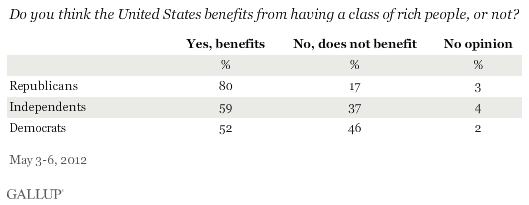
Majority of Americans Would Themselves Like to Be Rich
Not only do a majority of Americans believe that having a class of rich people is a good thing, but the majority of Americans who do not consider themselves rich now would like to be rich if they had their choice. In fact, slightly more Americans now than in 1990 or in 1996 say they would want to be rich if they had a choice.
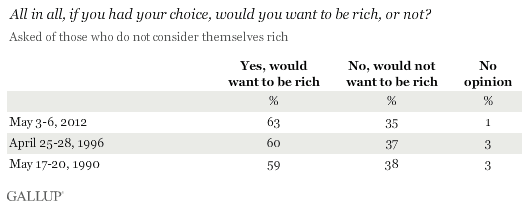
There are virtually no differences by partisanship in the desire to be rich. Sixty-four percent of both Republicans and Democrats say they would like to be rich, coupled with 63% of independents.
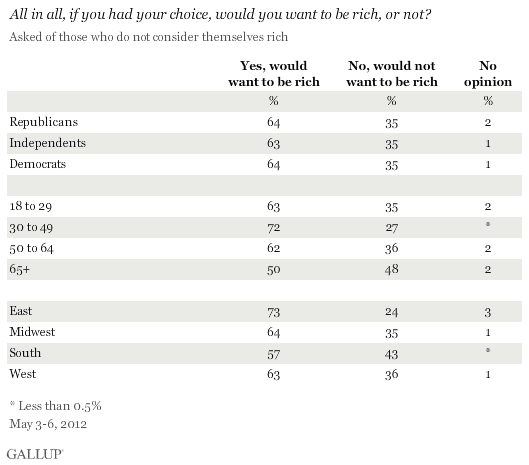
Desire to be rich peaks among Americans aged 30 to 49, and is lowest among those 65 and older -- who presumably have come to be at peace with their financial status in life. Americans living in the East are more likely to want to become rich than are those living elsewhere, particularly those in the South.
Hope of Being Rich Springs Eternal in Young People
Gallup has asked Americans four times since 1990 how likely it is that they themselves will ever be rich, and responses are slightly less optimistic now than they were in the 1990s or in 2003. Twenty-eight percent of Americans now say it is at least somewhat likely that they will ever be rich, down from a peak of 34% in 1996. On the other hand, a minority of 32% totally rule out the possibility, saying it is not at all likely that they will ever be rich.
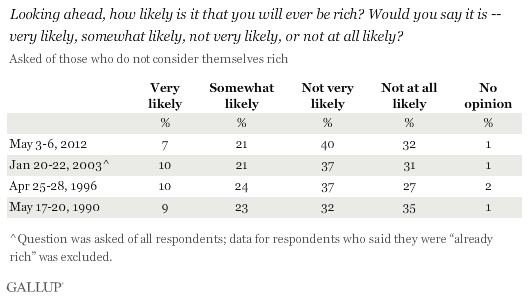
Not surprisingly, optimism about one's chances of becoming rich decreases with age. Almost half of those under 30 say it is at least somewhat likely that they will ever be rich. By the time Americans reach age 65 and beyond, only 8% say it is at least somewhat likely they will be rich.
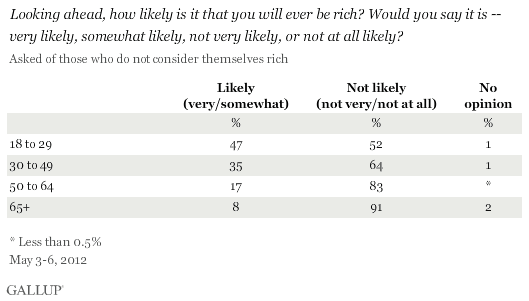
Rich Aren't Happier
Despite their personal desire to be rich, Americans appear to believe that achieving this financial status wouldn't necessarily make them happier. About one in 10 Americans say the rich are happier than they themselves are, unchanged since 1990. There has, however, been a slight decrease in the percentage of Americans who say the rich are less happy than they are, to 27% from 36% in 1990.
Americans' consistent disagreement with the idea that the rich are happier than they themselves are may reflect a variety of factors. Americans who are not rich may simply not want to concede that they are missing out on something that would make them happier, or they may perceive that being rich carries with it new problems or that happiness is related to much more than wealth.
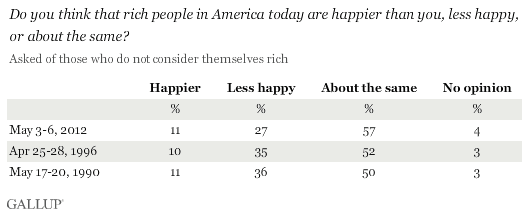
Implications
The majority of Americans not only think it is good for society to have a class of rich people, but would themselves like to be rich. These attitudes have held constant over the last two decades -- even as politicians have decried the fact that the rich get richer while the middle class stagnates, and amid calls for increased taxes on the rich to help redistribute income. Thus, Gallup finds no signs -- at least, based on these measures -- that Americans are becoming more and more negative about the existence of people in society who have a lot more income and wealth than most of the rest.
It also appears that the American dream is alive and well in the minds of young Americans, almost half of whom think it is at least somewhat likely that they themselves will be rich someday. But it's not solely young people. The fact that even 8% of those who are 65 and older hold on to the possibility that they might be rich someday suggests that the dream of being wealthy lives on in the hearts and minds of some Americans even as they approach the end of their lives.
Survey Methods
Results for this Gallup poll are based on telephone interviews conducted May 3-6, 2012, with a random sample of 1.024 adults, aged 18 and older, living in all 50 U.S. states and the District of Columbia.
For results based on the total sample of national adults, one can say with 95% confidence that the maximum margin of sampling error is ±3 percentage points.
Interviews are conducted with respondents on landline telephones and cellular phones, with interviews conducted in Spanish for respondents who are primarily Spanish-speaking. Each sample includes a minimum quota of 400 cell phone respondents and 600 landline respondents per 1,000 national adults, with additional minimum quotas among landline respondents by region. Landline telephone numbers are chosen at random among listed telephone numbers. Cell phone numbers are selected using random-digit-dial methods. Landline respondents are chosen at random within each household on the basis of which member had the most recent birthday.
Samples are weighted by gender, age, race, Hispanic ethnicity, education, region, adults in the household, and phone status (cell phone only/landline only/both, cell phone mostly, and having an unlisted landline number). Demographic weighting targets are based on the March 2011 Current Population Survey figures for the aged 18 and older non-institutionalized population living in U.S. telephone households. All reported margins of sampling error include the computed design effects for weighting and sample design.
In addition to sampling error, question wording and practical difficulties in conducting surveys can introduce error or bias into the findings of public opinion polls.
View methodology, full question results, and trend data.
For more details on Gallup's polling methodology, visit www.gallup.com.
